Why You Shouldn't Look Up 'What Happened On This Day in History?’

It started simply enough. Two dramatic events “On This Day in History” – April 26 – crossed my social media transom early this morning. Each pertained to Virginia history, so I thought maybe I’d write something of interest for The Falls Church Independent.
Little did I know that, after some cursory research, I discovered way too much happened historically “on this day.” Not only that, but it appears a ridiculous amount of important stuff occurred every other “day in history” as well.
But, I digress.
Certainly the two items of Virginia history that I saw occurred on April 26 are highly significant to world history as well as fascinating episodes in human drama. They were:
April 26, 1607 Three shiploads of English settlers arrive on the shore of present-day Virginia. The settlement of Jamestown is founded less than three weeks later. Sent by the Virginia Company of London, the colonists arrive hoping to find gold and other valuable resources.
April 26, 1865 John Wilkes Booth is killed at a Virginia farm twelve days after assassinating President Abraham Lincoln.
Human drama and historical significance in the first case is clear.
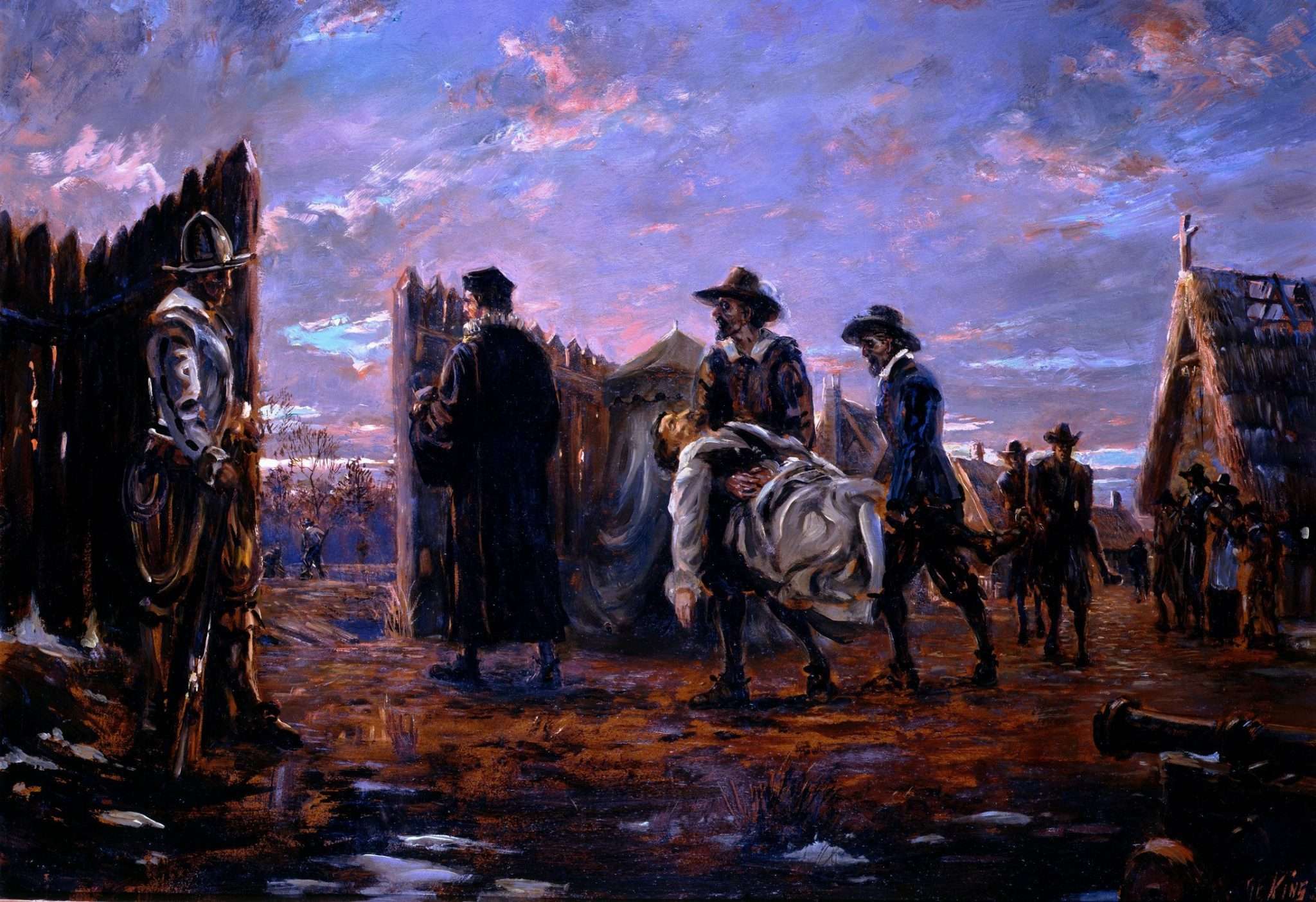
When settlers from the Virginia Company of London – 104 men and boys; “fair maidens” would be sent for later – arrived in Jamestown “on this day” in 1607, little did they know three things: First, instead of hanging their prisoner John Smith, as they desired, their instructions from London were to put the man in charge, hence the “Captain” John Smith of whom we know. Second, during the “Starving Time” a few winters later, many in the struggling settlement would either die of malnourishment, or engage in cannibalism, or both (but not in that order). And third, despite pathetic beginnings in Virginia – don’t forget the Lost Colony of Roanoke of 1587 – the colony’s eventual success would set England on the path to eventual colonial supremacy in the Americas, leading both to Great Britain’s predominance as a world empire, and, ironically, to the anti-colonial American Revolution.
An Archeological Diversion...
And if you’re a skeptic that the English would eat each other at Jamestown, it’s been confirmed through archeological records. Even though six different accounts of cannibalism are contained in the Jamestown records – including one from former Jamestown president George Percy in 1625 recounting that during the Starving Time, “notheinge was Spared to mainteyne Lyfe … as to digge upp deade corpes outt of graves and to eate them.”
According to Archeology.org, “William Kelso, an archaeologist with Preservation Virginia who has excavated Jamestown since 1994, doubted Percy’s horrific descriptions — until [the Spring of 2014], when his team found the butchered skull of a 14-year-old girl buried in a trash pit along with the remains of horses and dogs, other sources of food for the desperate colonists. Jane, as the girl is now known, was originally thought to have been an upper-class settler, but recent analysis found her skeleton has low lead levels. The rich at Jamestown ate from pewter dishes, essentially giving themselves lead poisoning. Jane’s remains are the first physical evidence of cannibalism at any American colony. 'There’s no doubt cannibalism happened,' says Kelso. 'It says how close to failure this colony came.' "
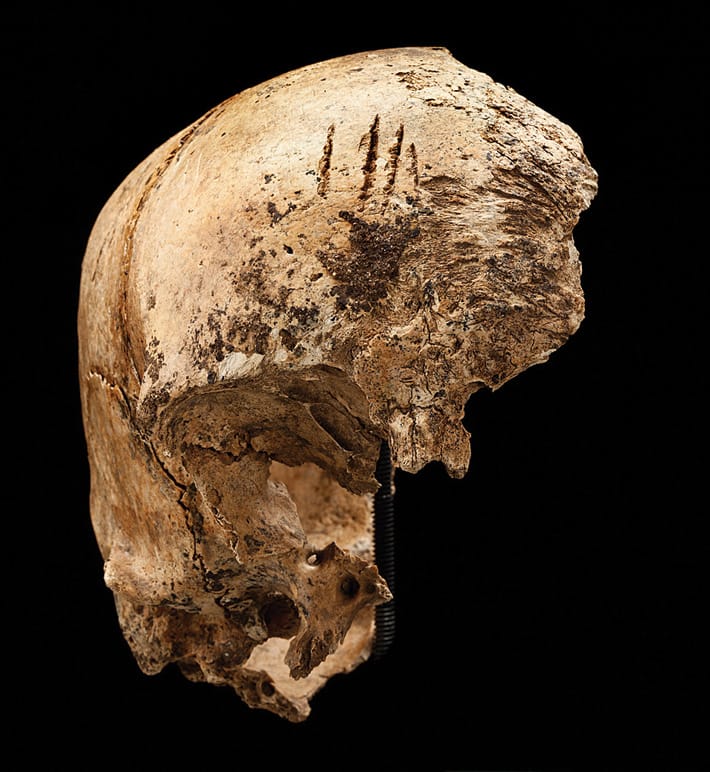
As far as the second key event “On This Day” in 1865, I’m sure it’s obvious to many. Just five days after the end of the U.S. Civil War, when Lee surrendered to Grant at Appomattox Court House in Virginia, ending the bloodiest war in American history, the noted American actor, John Wilkes Booth, of Maryland – son of famous English/American Shakespearian actor Junius Brutus Booth – assassinated perhaps the nation’s greatest president, Abraham Lincoln, during a performance of “Our American Cousin,” a comedy, at Ford’s Theatre in Washington, D.C. Not only had Lincoln signed the 13th Amendment abolishing slavery into law just a few months before, but he managed in just four years to defeat the secessionists while sounding a conciliatory tone about putting the United States back together with a “new birth of freedom” while being guided by the "better angels of our nature."
After shooting Lincoln – as well as stabbing Lincoln’s guest Major Henry Rathbone who tried to defend the President – Booth infamously jumped down from the presidential box onto the stage at Ford’s Theatre shouting to the audience, with a dagger in one hand, “Sic Semper Tyrannis,” purportedly quoting Brutus's words upon assassinating Caesar – and breaking the actor's left leg upon landing.
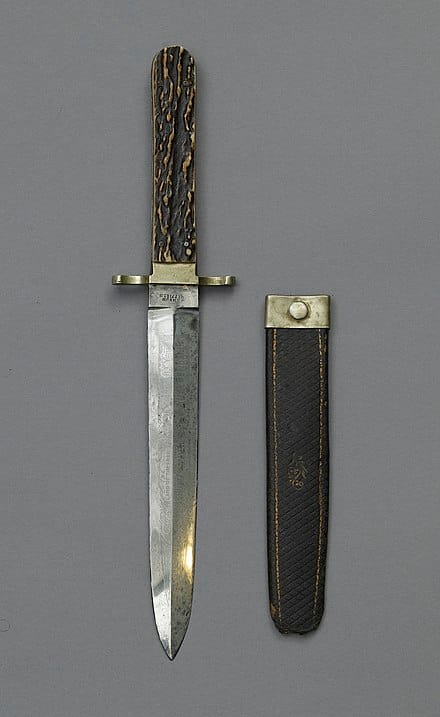
The American Battlefield Trust then picks up on Booth’s whereabouts following the very public assassination. “Booth moved south, making several stops at the homes of Confederate sympathizers, as well as unaware citizens, he crossed the Potomac into Virginia on April 23rd. On the morning of April 26th, Troopers of the 16th New York Cavalry caught up with him at the farm of Richard Garrett near Port Royal. His accomplice, David Herold, surrendered, but Booth remained in Garrett’s barn which was quickly set aflame by the cavalrymen. One soldier, Boston Corbett, approached the barn and claimed to have seen Booth leveling his pistol at him, so Corbett fired a round from his revolver. The bullet severed Booth’s spinal cord and paralyzed him. John Wilkes Booth died three hours later. His last words were spoken while looking at his hands. “Useless, useless, useless.” He is buried in an unmarked grave at the family plot in Green Mount Cemetery in Baltimore.”
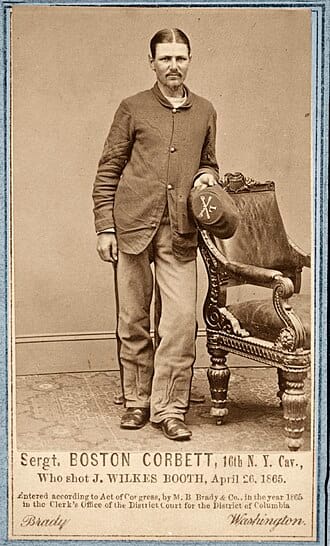
And, of course, there was fallout in other ways from Booth’s rash acts. Returning to the scene at Ford’s Theatre, when Major Rathbone attempted to apprehend Booth, “Booth stabbed and seriously wounded him,” per Wikipedia. “Rathbone may have played a part in Booth's leg injury. Although [Rathbone] recovered, [his] mental state deteriorated afterwards, and in 1883, he murdered his wife, Clara, in a fit of madness, later being declared insane by doctors and living the rest of his life in a lunatic asylum.”
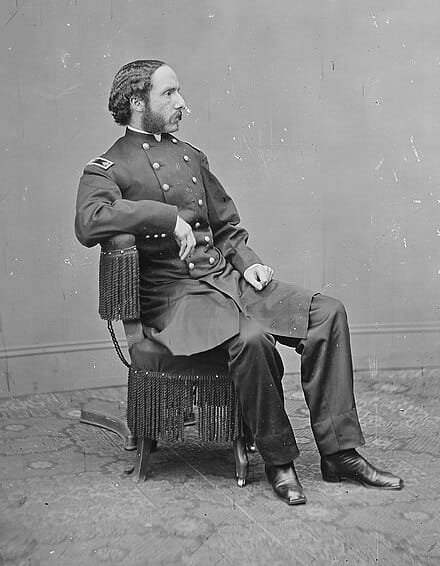
Too Many Other Events Also Took Place “On This Day in History”
Having fallen into Wikipedia’s Major Rathbone rabbit hole, I decided to look for more authoritative historical sources on what happened “on this day” in history. So, I found an Associated Press (AP) article published proudly in the Wausau Pilot and Review of Wisconsin concerning what happened on this 117th day of 2024. The problem is, too many damn things.
In addition to the bit about Jamestown settlement and the death of John Wilkes Booth, we also hear about:
Chernobyl: “On April 26, 1986, an explosion and fire at the Chernobyl nuclear power plant in Ukraine caused radioactive fallout to begin spewing into the atmosphere. (Dozens of people were killed in the immediate aftermath of the disaster while the long-term death toll from radiation poisoning is believed to number in the thousands.)”
Mary Phagan: “In 1913, Mary Phagan, a 13-year-old worker at a Georgia pencil factory, was strangled; Leo Frank, the factory superintendent, was convicted of her murder and sentenced to death. (Frank’s death sentence was commuted, but he was lynched by an anti-Semitic mob in 1915.)”
The Gestapo: “In 1933, Nazi Germany’s infamous secret police, the Gestapo, was created.”
Tanzania: “In 1964, the African nations of Tanganyika and Zanzibar merged to form Tanzania.”
“Boxcar”: “In 1968, the United States exploded beneath the Nevada desert a 1.3 megaton nuclear device called ‘Boxcar.’”
Studio 54: “In 1977, the legendary nightclub Studio 54 had its opening night in New York.”

Count Basie: In 1984, bandleader Count Basie, 79, died in Hollywood, Florida.
Nelson Mandela: “In 1994, voting began in South Africa’s first all-race elections, resulting in victory for the African National Congress and the inauguration of Nelson Mandela as president.”

Howard Dean: “In 2000, Vermont Gov. Howard Dean signed the nation’s first bill allowing same-sex couples to form civil unions.”
Swine Flu: “ In 2009, the United States declared a public health emergency as more possible cases of swine flu surfaced from Canada to New Zealand; officials in Mexico City closed everything from concerts to sports matches to churches in an effort to stem the spread of the virus.”
Charles Taylor: “In 2012, former Liberian President Charles Taylor became the first head of state since World War II to be convicted by an international war crimes court as he was found guilty of arming Sierra Leone rebels in exchange for “blood diamonds” mined by slave laborers and smuggled across the border. (Taylor was sentenced to 50 years in prison.)”
George Jones: In 2013, singer George Jones, believed by many to be the greatest country crooner of all time, died in Nashville at age 81.
Bill Cosby: “In 2018, comedian Bill Cosby was convicted of drugging and molesting Temple University employee Andrea Constand at his suburban Philadelphia mansion in 2004. (Cosby was later sentenced to three to 10 years in prison, but Pennsylvania’s highest court threw out the conviction and released him from prison in June 2021, ruling that the prosecutor in the case was bound by his predecessor’s agreement not to charge Cosby.)”
Russia vs. Ukraine: “In 2022, Russia pounded eastern and southern Ukraine as the U.S. promised to “keep moving heaven and earth” to get Kyiv the weapons it needed to repel the new offensive, despite Moscow’s warnings that such support could trigger a wider war.”
And too many birthdays to even keep track of! Today’s Birthdays: Actor-comedian Carol Burnett is 91. R&B singer Maurice Williams is 86. Songwriter-musician Duane Eddy is 86. Actor Nancy Lenehan is 71. Actor Giancarlo Esposito is 66. Rock musician Roger Taylor (Duran Duran) is 64. Actor Joan Chen is 63. Rock musician Chris Mars (The Replacements) is 63. Actor-singer Michael Damian is 62. Actor Jet Li (lee) is 61. Actor-comedian Kevin James is 59. Author and former U.S. Poet Laureate Natasha Trethewey is 58. Actor Marianne Jean-Baptiste is 57. Rapper T-Boz (TLC) is 54. Former first lady Melania Trump is 54. Actor Shondrella Avery is 53. Actor Simbi Kali is 53. Country musician Jay DeMarcus (Rascal Flatts) is 53. Rock musician Jose Pasillas (Incubus) is 48. Actor Jason Earles is 47. Actor Leonard Earl Howze is 47. Actor Amin Joseph is 47. Actor Tom Welling is 47. Actor Pablo Schreiber is 46. Actor Nyambi Nyambi is 45. Actor Jordana Brewster is 44. Actor Stana Katic is 44. Actor Marnette Patterson is 44. Actor Channing Tatum is 44. Americana/roots singer-songwriter Lilly Hiatt is 40. Actor Emily Wickersham is 40. Actor Aaron Meeks is 38. New York Yankees outfielder Aaron Judge is 32.
Asking ChatGPT to Simplify
Finally, I resorted to ChatGPT to try to simplify my search. Soon, I had regretted my prompts and queries to the know-it-all chatbot. I was informed confidently of another never-ending array of April 26th historical events:
Guernica [How had AP missed that?] “1937: Guernica Bombing: During the Spanish Civil War, on April 26, 1937, the town of Guernica in Spain was bombed by German and Italian aircraft, resulting in significant civilian casualties. The event inspired Pablo Picasso's famous painting "Guernica" and drew international attention to the brutality of modern warfare.”
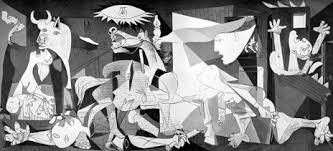
Sinking of the Sultana: “1865: Sinking of the Sultana: The steamship Sultana, carrying Union soldiers recently released from Confederate prison camps, exploded and sank in the Mississippi River near Memphis, Tennessee, on April 26, 1865. It remains one of the deadliest maritime disasters in United States history, with an estimated 1,800 to 1,900 lives lost.”
Louisiana Purchase [Seriously, AP?]: “1803: Louisiana Purchase Treaty Signed: On April 26, 1803, the United States and France signed the Louisiana Purchase Treaty, which effectively doubled the size of the United States by acquiring the territory of Louisiana from France for $15 million.”
Tiananmen Square [Okay, Now I'm Really Disappointed with the AP Piece in the Wasau Pilot and Review!]: “1989: Tiananmen Square Protests Begin: On April 26, 1989, mass pro-democracy protests began in Tiananmen Square in Beijing, China. The demonstrations, led by students and intellectuals, called for political reform and greater freedom. The protests culminated in the Tiananmen Square Massacre on June 4th.”

Pazzi Conspiracy: “1478: Pazzi Conspiracy: On April 26, 1478, the Pazzi Conspiracy took place in Florence, Italy. The conspiracy, led by the Pazzi family and supported by Pope Sixtus IV, aimed to overthrow the ruling Medici family. The assassination attempt on Lorenzo de' Medici failed, leading to the brutal suppression of the conspirators.”
Geraldo Rivera: “1986: Geraldo Rivera Opens Al Capone's Vault: On April 26, 1986, American television journalist Geraldo Rivera hosted a live two-hour special titled "The Mystery of Al Capone's Vaults." Rivera promised to reveal the contents of a secret vault purportedly belonging to the infamous gangster Al Capone. However, the vault turned out to be empty, disappointing viewers worldwide.”
Battle of Bautzen Ends: “1945: Battle of Bautzen Ends: On April 26, 1945, during World War II, the Battle of Bautzen ended with a Soviet victory. The battle, fought between German and Soviet forces, was part of the larger Soviet offensive aimed at capturing Berlin. The Soviet victory at Bautzen contributed to the eventual defeat of Nazi Germany.”
Finally, It Was All Too Much…
Before long, I was rerouted in my exhaustive research back to a Wikipedia listing covering “All Things April 26th.” I’m afraid its tiresomeness was beyond my capacities. Notwithstanding, I present it forthwith – as if you couldn't find it online for yourselves:
Events [April 26]
Pre-1600
- 1336 – Francesco Petrarca (Petrarch) ascends Mont Ventoux.[1]
- 1478 – The Pazzi family attack on Lorenzo de' Medici in order to displace the ruling Medici family kills his brother Giuliano during High Mass in Florence Cathedral.[2]
- 1564 – Playwright William Shakespeare is baptized in Stratford-upon-Avon, Warwickshire, England (date of birth is unknown).
1601–1900
- 1607 – The Virginia Company colonists make landfall at Cape Henry.
- 1721 – A massive earthquake devastates the Iranian city of Tabriz.[3]
- 1777 – Sybil Ludington, aged 16, allegedly rode 40 miles (64 km) to alert American colonial forces to the approach of the British regular forces
- 1794 – Battle of Beaumont during the Flanders Campaign of the War of the First Coalition.
- 1802 – Napoleon Bonaparte signs a general amnesty to allow all but about one thousand of the most notorious émigrés of the French Revolution to return to France.[4]
- 1803 – Thousands of meteor fragments fall from the skies of L'Aigle, France; the event convinces European scientists that meteors exist.
- 1805 – First Barbary War: United States Marines captured Derne under the command of First Lieutenant Presley O'Bannon.
- 1865 – Union cavalry troopers corner and shoot dead John Wilkes Booth, assassin of President Abraham Lincoln, in Virginia.
- 1900 – Fires destroy Canadian cities Ottawa and Hull, reducing them to ashes in 12 hours. Twelve thousand people are left without a home.[5]
1901–present
- 1903 – Atlético Madrid Association football club is founded
- 1915 – World War I: Italy secretly signs the Treaty of London pledging to join the Allied Powers.[6]
- 1916 – Easter Rising: Battle of Mount Street Bridge[7]
- 1920 – Ice hockey makes its Olympic debut at the Antwerp Games with center Frank Fredrickson scoring seven goals in Canada's 12–1 drubbing of Sweden in the gold medal match.[8]
- 1923 – The Duke of York weds Lady Elizabeth Bowes-Lyon at Westminster Abbey.[9]
- 1925 – Paul von Hindenburg defeats Wilhelm Marx in the second round of the German presidential election to become the first directly elected head of state of the Weimar Republic.
- 1933 – The Gestapo, the official secret police force of Nazi Germany, is established by Hermann Göring.
- 1937 – Spanish Civil War: Guernica, Spain, is bombed by German Luftwaffe.
- 1942 – Benxihu Colliery accident in Manchukuo leaves 1,549 Chinese miners dead.
- 1943 – The Easter Riots break out in Uppsala, Sweden.
- 1944 – Georgios Papandreou becomes head of the Greek government-in-exile based in Egypt.
- 1944 – Heinrich Kreipe is captured by Allied commandos in occupied Crete.
- 1945 – World War II: Battle of Bautzen: Last successful German tank-offensive of the war and last noteworthy victory of the Wehrmacht.
- 1945 – World War II: Filipino troops of the 66th Infantry Regiment, Philippine Commonwealth Army, USAFIP-NL and the American troops of the 33rd and 37th Infantry Division, United States Army liberate Baguio as they fight against the Japanese forces under General Tomoyuki Yamashita.
- 1954 – The Geneva Conference, an effort to restore peace in Indochina and Korea, begins.
- 1954 – The first clinical trials of Jonas Salk's polio vaccine begin in Fairfax County, Virginia.[10]
- 1956 – SS Ideal X, the world's first successful container ship, leaves Port Newark, New Jersey, for Houston, Texas.
- 1958 – Final run of the Baltimore and Ohio Railroad's Royal Blue from Washington, D.C., to New York City after 68 years, the first U.S. passenger train to use electric locomotives.
- 1960 – Forced out by the April Revolution, President of South Korea Syngman Rhee resigns after 12 years of dictatorial rule.
- 1962 – NASA's Ranger 4 spacecraft crashes into the Moon.
- 1962 – The British space programme launches its first satellite, the Ariel 1.[11]
- 1963 – In Libya, amendments to the constitution transform Libya (United Kingdom of Libya) into one national unity (Kingdom of Libya) and allows for female participation in elections.
- 1964 – Tanganyika and Zanzibar merge to form the United Republic of Tanzania.
- 1966 – The magnitude 5.1 Tashkent earthquake affects the largest city in Soviet Central Asia with a maximum MSK intensity of VII (Very strong). Tashkent is mostly destroyed and 15–200 are killed.
- 1966 – A new government is formed in the Republic of the Congo, led by Ambroise Noumazalaye.
- 1970 – The Convention Establishing the World Intellectual Property Organization enters into force.
- 1981 – Dr. Michael R. Harrison of the University of California, San Francisco Medical Center performs the world's first human open fetal surgery.
- 1986 – The Chernobyl disaster occurs in the Ukrainian Soviet Socialist Republic.
- 1989 – The deadliest known tornado strikes Central Bangladesh, killing upwards of 1,300, injuring 12,000, and leaving as many as 80,000 homeless.
- 1989 – People's Daily publishes the April 26 Editorial which inflames the nascent Tiananmen Square protests.
- 1991 – Fifty-five tornadoes break out in the central United States. Before the outbreak's end, Andover, Kansas, would record the year's only F5 tornado.
- 1993 – The Space Shuttle Columbia is launched on mission STS-55 to conduct experiments aboard the Spacelab module.[12]
- 1994 – China Airlines Flight 140 crashes at Nagoya Airport in Japan, killing 264 of the 271 people on board.
- 1994 – South Africa begins its first multiracial election, which is won by Nelson Mandela's African National Congress.[13]
- 2002 – Robert Steinhäuser kills 16 at Gutenberg-Gymnasium in Erfurt, Germany before committing suicide.
- 2005 – Cedar Revolution: Under international pressure, Syria withdraws the last of its 14,000 troop military garrison in Lebanon, ending its 29-year military domination of that country (Syrian occupation of Lebanon).
- 2015 – Nursultan Nazarbayev is re-elected President of Kazakhstan with 97.7% of the vote, one of the biggest vote shares in Kazakhstan's history.[14]
Births
Pre-1600
- 121 – Marcus Aurelius, Roman emperor (d. 180)[15]
- 757 – Hisham I of Córdoba (d. 796)
- 764 – Al-Hadi, Abbasid caliph (d. 786)
- 1284 – Alice de Toeni, Countess of Warwick (d. 1324)
- 1319 – John II of France (d. 1364)[16]
- 1538 – Gian Paolo Lomazzo, Italian painter and academic (d. 1600)
- 1575 – Marie de' Medici, queen of Henry IV of France (d. 1642)
1601–1900
- 1647 – William Ashhurst, English banker, Sheriff of London, Lord Mayor of London and politician (d. 1720)
- 1648 – Peter II of Portugal (d. 1706)[17]
- 1697 – Adam Falckenhagen, German lute player and composer (d. 1754)
- 1710 – Thomas Reid, Scottish philosopher and academic (d. 1796)
- 1718 – Esek Hopkins, American commander (d. 1802)
- 1774 – Christian Leopold von Buch, German geologist and paleontologist (d. 1853)
- 1782 – Maria Amalia of Naples and Sicily, Queen of France (d. 1866)[18]
- 1785 – John James Audubon, French-American ornithologist and painter (d. 1851)[19]
- 1787 – Ludwig Uhland, German poet, philologist, and historian (d. 1862)
- 1798 – Eugène Delacroix, French painter and lithographer (d. 1863)[20]
- 1801 – Ambrose Dudley Mann, American politician and diplomat, 1st United States Assistant Secretary of State (d. 1889)
- 1804 – Charles Goodyear, American banker, lawyer, and politician (d. 1876)
- 1822 – Frederick Law Olmsted, American journalist and designer, co-designed Central Park (d. 1903)
- 1834 – Charles Farrar Browne, American author (d. 1867)
- 1856 – Joseph Ward, Australian-New Zealand businessman and politician, 17th Prime Minister of New Zealand (d. 1930)
- 1862 – Edmund C. Tarbell, American painter and educator (d. 1938)
- 1865 – Akseli Gallen-Kallela, Finnish artist (d. 1931)[21]
- 1876 – Ernst Felle, German rower (d. 1959)
- 1877 – James Dooley, Irish-Australian politician, 21st Premier of New South Wales (d. 1950)
- 1878 – Rafael Guízar y Valencia, Mexican bishop and saint (d. 1938)
- 1879 – Eric Campbell, British actor (d. 1917)
- 1879 – Owen Willans Richardson, English physicist and academic, Nobel Prize laureate (d. 1959)
- 1886 – Ma Rainey, American singer-songwriter (d. 1939)
- 1886 – Ğabdulla Tuqay, Russian poet and publicist (d. 1913)
- 1889 – Anita Loos, American author, playwright, and screenwriter (d. 1981)
- 1889 – Ludwig Wittgenstein, Austrian-English philosopher and academic (d. 1951)
- 1894 – Rudolf Hess, Egyptian-German politician (d. 1987)
- 1896 – Ruut Tarmo, Estonian actor and director (d. 1967)
- 1896 – Ernst Udet, German colonel and pilot (d. 1941)
- 1897 – Eddie Eagan, American boxer and bobsledder (d. 1967)
- 1897 – Douglas Sirk, German-American director and screenwriter (d. 1987)
- 1898 – Vicente Aleixandre, Spanish poet and author, Nobel Prize laureate (d. 1984)
- 1898 – John Grierson, Scottish director and producer (d. 1972)
- 1899 – Oscar Rabin, Latvian-English saxophonist and bandleader (d. 1958)
- 1900 – Eva Aschoff, German bookbinder and calligrapher (d. 1969)[22]
- 1900 – Charles Francis Richter, American seismologist and physicist (d. 1985)
- 1900 – Hack Wilson, American baseball player (d. 1948)
1901–present
- 1904 – Paul-Émile Léger, Canadian cardinal (d. 1991)
- 1904 – Xenophon Zolotas, Greek economist and politician, 177th Prime Minister of Greece (d. 2004)
- 1905 – Jean Vigo, French director and screenwriter (d. 1934)
- 1907 – Ilias Tsirimokos, Greek politician, Prime Minister of Greece (d. 1968)
- 1909 – Marianne Hoppe, German actress (d. 2002)
- 1910 – Tomoyuki Tanaka, Japanese screenwriter and producer (d. 1997)
- 1911 – Paul Verner, German soldier and politician (d. 1986)
- 1912 – A. E. van Vogt, Canadian-American author (d. 2000)
- 1914 – Bernard Malamud, American novelist and short story writer (d. 1986)
- 1914 – James Rouse, American real estate developer (d. 1996)
- 1916 – Eyvind Earle, American artist, author, and illustrator (d. 2000)
- 1916 – Ken Wallis, English commander, engineer, and pilot (d. 2013)
- 1916 – Morris West, Australian author and playwright (d. 1999)
- 1917 – Sal Maglie, American baseball player and coach (d. 1992)
- 1917 – I. M. Pei, Chinese-American architect, designed the National Gallery of Art and Bank of China Tower (d. 2019)
- 1917 – Virgil Trucks, American baseball player and coach (d. 2013)
- 1918 – Fanny Blankers-Koen, Dutch sprinter and long jumper (d. 2004)
- 1921 – Jimmy Giuffre, American clarinet player, saxophonist, and composer (d. 2008)
- 1922 – J. C. Holt, English historian and academic (d. 2014)
- 1922 – Jeanne Sauvé, Canadian journalist and politician, Governor General of Canada (d. 1993)[23]
- 1922 – Margaret Scott, South African-Australian ballerina and choreographer (d. 2019)
- 1924 – Browning Ross, American runner and soldier (d. 1998)
- 1925 – Vladimir Boltyansky, Russian mathematician, educator and author (d. 2019)
- 1925 – Gerard Cafesjian, American businessman and philanthropist (d. 2013)
- 1925 – Michele Ferrero, Italian entrepreneur (d. 2015)
- 1925 – Frank Hahn, British economist (d. 2013)
- 1926 – Michael Mathias Prechtl, German soldier and illustrator (d. 2003)
- 1927 – Jack Douglas, English actor (d. 2008)
- 1927 – Anne McLaren, British scientist (d. 2007)[24]
- 1927 – Harry Gallatin, American basketball player and coach (d. 2015)
- 1927 – Granny Hamner, American baseball player (d. 1993)
- 1929 – Richard Mitchell, American author and educator (d. 2002)
- 1930 – Roger Moens, Belgian runner and sportscaster
- 1931 – Paul Almond, Canadian director, producer, and screenwriter (d. 2015)
- 1931 – Bernie Brillstein, American talent agent and producer (d. 2008)
- 1931 – John Cain Jr., Australian politician, 41st Premier of Victoria (d. 2019)
- 1932 – Israr Ahmed, Indian-Pakistani theologian, philosopher, and scholar (d. 2010)
- 1932 – Shirley Cawley, English long jumper
- 1932 – Frank D'Rone, American singer and guitarist (d. 2013)
- 1932 – Francis Lai, French accordion player and composer (d. 2018)
- 1932 – Michael Smith, English-Canadian biochemist and geneticist, Nobel Prize laureate (d. 2000)
- 1933 – Carol Burnett, American actress, singer, and producer[25]
- 1933 – Filiberto Ojeda Ríos, Puerto Rican-American general (d. 2005)
- 1933 – Arno Allan Penzias, German-American physicist and academic, Nobel Prize laureate (d. 2024)
- 1937 – Jean-Pierre Beltoise, French racing driver and motorcycle racer (d. 2015)
- 1938 – Duane Eddy, American singer-songwriter, guitarist, and actor[26]
- 1938 – Maurice Williams, American doo-wop/R&B singer-songwriter
- 1940 – Molvi Iftikhar Hussain Ansari, Indian cleric and politician (d. 2014)
- 1940 – Giorgio Moroder, Italian singer-songwriter and producer
- 1940 – Cliff Watson, English rugby league player (d. 2018)
- 1941 – Claudine Auger, French model and actress (d. 2019)
- 1942 – Svyatoslav Belza, Russian journalist, author, and critic (d. 2014)
- 1942 – Sharon Carstairs, Canadian lawyer and politician, Leader of the Government in the Senate
- 1942 – Michael Kergin, Canadian diplomat, Canadian Ambassador to the United States
- 1942 – Bobby Rydell, American singer and actor[27] (d. 2022)
- 1942 – Jadwiga Staniszkis, Polish sociologist, political scientist, and academic
- 1943 – Gary Wright, American singer-songwriter, keyboard player, and producer (d. 2023)
- 1943 – Peter Zumthor, Swiss architect and academic, designed the Therme Vals
- 1944 – Richard Bradshaw, English conductor (d. 2007)
- 1945 – Howard Davies, English director and producer (d. 2016)
- 1945 – Dick Johnson, Australian racing driver
- 1945 – Sylvain Simard, Canadian academic and politician
- 1946 – Ralph Coates, English international footballer (d. 2010)[28]
- 1946 – Marilyn Nelson, American poet and author
- 1946 – Alberto Quintano, Chilean footballer
- 1949 – Carlos Bianchi, Argentinian footballer and manager
- 1949 – Jerry Blackwell, American wrestler (d. 1995)
- 1950 – Junko Ohashi, Japanese singer (d. 2023)[29]
- 1951 – John Battle, English politician
- 1954 – Tatyana Fomina, Estonian chess player
- 1954 – Alan Hinkes, English mountaineer and explorer
- 1955 – Kurt Bodewig, German politician
- 1956 – Koo Stark, American actress and photographer
- 1958 – John Crichton-Stuart, 7th Marquess of Bute, Scottish racing driver (d. 2021)
- 1958 – Giancarlo Esposito, American actor, director, and producer[26]
- 1958 – Georgios Kostikos, Greek footballer, coach, and manager
- 1959 – John Corabi, American singer-songwriter and guitarist
- 1959 – Pedro Pierluisi, Puerto Rican politician[30]
- 1960 – H. G. Carrillo, American writer and academic (d. 2020)[31]
- 1960 – Steve Lombardozzi, American baseball player and coach
- 1960 – Roger Taylor, English drummer
- 1961 – Joan Chen, Chinese-American actress, director, producer, and screenwriter[26]
- 1961 – Chris Mars, American artist
- 1962 – Colin Anderson, English footballer
- 1962 – Debra Wilson, American actress and comedian
- 1963 – Jet Li, Chinese-Singaporean martial artist, actor, and producer[26]
- 1963 – Colin Scotts, Australian-American football player
- 1963 – Cornelia Ullrich, German hurdler
- 1963 – Bill Wennington, Canadian basketball player
- 1965 – Susannah Harker, English actress
- 1965 – Kevin James, American actor and comedian
- 1967 – Glenn Thomas Jacobs, American professional wrestler, actor, businessman and politician
- 1967 – Marianne Jean-Baptiste, English actress and singer-songwriter
- 1967 – Toomas Tõniste, Estonian sailor and politician
- 1970 – Dean Austin, English footballer and manager[32]
- 1970 – Melania Trump, Slovene-American model; 47th First Lady of the United States[26]
- 1970 – Kristen R. Ghodsee, American ethnographer and academic
- 1970 – Tionne "T-Boz" Watkins, American singer-songwriter, dancer, and actress
- 1971 – Naoki Tanaka, Japanese comedian and actor
- 1971 – Jay DeMarcus, American bass player, songwriter, and producer
- 1972 – Jason Bargwanna, Australian racing driver
- 1972 – Kiko, Spanish footballer
- 1972 – Natrone Means, American football player and coach
- 1972 – Avi Nimni, Israeli footballer and manager
- 1973 – Geoff Blum, American baseball player and sportscaster
- 1973 – Jules Naudet, French-American director and producer
- 1973 – Chris Perry, English footballer[33]
- 1973 – Óscar, Spanish footballer and coach
- 1975 – Joey Jordison, American musician and songwriter (d. 2021)[34]
- 1975 – Rahul Verma, Indian social worker and activist
- 1976 – Václav Varaďa, Czech ice hockey player
- 1977 – Samantha Cristoforetti, Italian astronaut
- 1977 – Kosuke Fukudome, Japanese baseball player[26]
- 1977 – Roxana Saberi, American journalist and author
- 1977 – Tom Welling, American actor[35]
- 1978 – Stana Katic, Canadian actress
- 1978 – Peter Madsen, Danish footballer
- 1980 – Jordana Brewster, Panamanian-American actress
- 1980 – Marlon King, English footballer
- 1980 – Anna Mucha, Polish actress and journalist
- 1980 – Channing Tatum, American actor and producer
- 1981 – Caro Emerald, Dutch pop and jazz singer
- 1981 – Ms. Dynamite, English rapper and producer
- 1981 – Sandra Schmitt, German skier (d. 2000)
- 1982 – Novlene Williams-Mills, Jamaican sprinter
- 1983 – José María López, Argentinian racing driver
- 1983 – Jessica Lynch, American soldier
- 1985 – John Isner, American tennis player
- 1986 – Lior Refaelov, Israeli footballer
- 1986 – Yuliya Zaripova, Russian runner
- 1987 – Jorge Andújar Moreno, Spanish footballer
- 1989 – Melvin Ingram, American football player
- 1989 – Kang Daesung, South Korean singer[36]
- 1990 – Jonathan dos Santos, Mexican footballer[37]
- 1990 – Mitch Rein, Australian rugby league player
- 1990 – Nevin Spence, Northern Irish rugby player (d. 2012)
- 1990 – Joey Wendle, American baseball player[38]
- 1991 – Peter Handscomb, Australian cricketer
- 1991 – Isaac Liu, New Zealand rugby league player
- 1992 – Aaron Judge, American baseball player
- 1992 – Delon Wright, American basketball player[39]
- 1994 – Daniil Kvyat, Russian racing driver[40]
- 1994 – Odysseas Vlachodimos, Greek international footballer[41]
- 1996 – Jordan Pefok, American footballer[42]
- 2001 – Thiago Almada, Argentine footballer[43]
Deaths
Pre-1600
- 499 – Emperor Xiaowen of Northern Wei (b. 467)
- 645 – Richarius, Frankish monk and saint (b. 560)
- 680 – Mu'awiya I, Umayyad caliph (b. 602)
- 757 – Pope Stephen II (b. 715)
- 893 – Chen Jingxuan, general of the Tang Dynasty
- 962 – Adalbero I, bishop of Metz
- 1192 – Emperor Go-Shirakawa of Japan (b. 1127)
- 1366 – Simon Islip, Archbishop of Canterbury
- 1392 – Jeong Mong-ju, Korean civil minister, diplomat and scholar (b. 1338)
- 1444 – Robert Campin, Flemish painter (b. 1378)
- 1478 – Giuliano de' Medici, Italian ruler (b. 1453)
- 1489 – Ashikaga Yoshihisa, Japanese shōgun (b. 1465)
- 1558 – Jean Fernel, French physician (b. 1497)[44]
1601–1900
- 1686 – Magnus Gabriel De la Gardie, Swedish statesman and military man (b. 1622)
- 1716 – John Somers, 1st Baron Somers, English jurist and politician, Lord High Chancellor of Great Britain (b. 1651)
- 1784 – Nano Nagle, Irish nun and educator, founded the Presentation Sisters (b. 1718)
- 1789 – Petr Ivanovich Panin, Russian general (b. 1721)
- 1809 – Bernhard Schott, German music publisher (b. 1748)[45]
- 1865 – John Wilkes Booth, American actor, assassin of Abraham Lincoln (b. 1838)
- 1881 – Ludwig Freiherr von und zu der Tann-Rathsamhausen, German general (b. 1815)
- 1895 – Eric Stenbock, Estonian-English author and poet (b. 1860)
1901–present
- 1910 – Bjørnstjerne Bjørnson, Norwegian-French author, poet, and playwright, Nobel Prize laureate (b. 1832)
- 1915 – John Bunny, American actor (b. 1863)
- 1915 – Ida Hunt Udall, American diarist (b. 1858)[46]
- 1916 – Mário de Sá-Carneiro, Portuguese poet and writer (b. 1890)[47]
- 1920 – Srinivasa Ramanujan, Indian mathematician and theorist (b. 1887)
- 1932 – William Lockwood, English cricketer (b. 1868)
- 1934 – Arturs Alberings, Latvian politician, former Prime Minister of Latvia (b. 1876)
- 1940 – Carl Bosch, German chemist and engineer, Nobel Prize laureate (b. 1874)
- 1944 – Violette Morris, French footballer, shot putter, and discus thrower (b. 1893)
- 1945 – Sigmund Rascher, German physician (b. 1909)
- 1945 – Pavlo Skoropadskyi, German-Ukrainian general and politician, Hetman of Ukraine (b. 1871)
- 1946 – James Larkin White, American miner, explorer, and park ranger (b. 1882)
- 1950 – George Murray Hulbert, American lawyer, judge, and politician (b. 1881)
- 1951 – Arnold Sommerfeld, German physicist and academic (b. 1868)
- 1956 – Edward Arnold, American actor (b. 1890)
- 1957 – Gichin Funakoshi, Japanese martial artist, founded Shotokan (b. 1868)
- 1964 – E. J. Pratt, Canadian poet and author (b. 1882)
- 1968 – John Heartfield, German illustrator and photographer (b. 1891)
- 1969 – Morihei Ueshiba, Japanese martial artist, founded aikido (b. 1883)
- 1970 – Erik Bergman, Swedish minister and author (b. 1886)
- 1970 – Gypsy Rose Lee, American actress, striptease dancer, and writer (b. 1911)
- 1973 – Irene Ryan, American actress and philanthropist (b. 1902)
- 1976 – Sidney Franklin, American bullfighter (b. 1903)
- 1976 – Sid James, South African-English actor (b. 1913)
- 1976 – Armstrong Sperry, American author and illustrator (b. 1897)
- 1980 – Cicely Courtneidge, Australian-born British actress, comedian and singer (b. 1893)
- 1981 – Jim Davis, American actor (b. 1909)
- 1984 – Count Basie, American pianist, composer, and bandleader (b. 1904)
- 1986 – Broderick Crawford, American actor (b. 1911)
- 1986 – Bessie Love, American actress (b. 1898)
- 1986 – Dechko Uzunov, Bulgarian painter (b. 1899)
- 1987 – Shankar, Indian composer and conductor (b. 1922)
- 1987 – John Silkin, English lawyer and politician, Shadow Leader of the House of Commons (b. 1923)
- 1989 – Lucille Ball, American model, actress, comedian, and producer (b. 1911)
- 1991 – Leo Arnaud, French-American composer and conductor (b. 1904)
- 1991 – Carmine Coppola, American composer and conductor (b. 1910)
- 1991 – A. B. Guthrie, Jr., American novelist and historian, (b. 1901)
- 1991 – Richard Hatfield, Canadian lawyer and politician, 26th Premier of New Brunswick (b. 1931)
- 1994 – Masutatsu Ōyama, Japanese martial artist, founded Kyokushin kaikan (b. 1923)
- 1996 – Stirling Silliphant, American screenwriter and producer (b. 1918)
- 1999 – Adrian Borland, English singer-songwriter, guitarist, and producer (b. 1957)
- 1999 – Jill Dando, English journalist and television personality (b. 1961)[48]
- 2003 – Rosemary Brown, Jamaican-Canadian academic and politician (b. 1930)
- 2003 – Yun Hyon-seok, South Korean poet and author (b. 1984)
- 2003 – Edward Max Nicholson, Irish environmentalist, co-founded the World Wide Fund for Nature (b. 1904)
- 2004 – Hubert Selby, Jr., American author, poet, and screenwriter (b. 1928)
- 2005 – Mason Adams, American actor (b. 1919)
- 2005 – Elisabeth Domitien, Prime Minister of the Central African Republic (b. 1925)[49]
- 2005 – Maria Schell, Austrian-Swiss actress (b. 1926)
- 2005 – Augusto Roa Bastos, Paraguayan journalist, author, and academic (b. 1917)
- 2007 – Jack Valenti, American businessman, created the MPAA film rating system (b. 1921)
- 2008 – Árpád Orbán, Hungarian footballer (b. 1938)[50][51]
- 2009 – Hans Holzer, Austrian-American paranormal investigator and author (b. 1920)
- 2010 – Mariam A. Aleem, Egyptian graphic designer and academic (b. 1930)
- 2010 – Urs Felber, Swiss engineer and businessman (b. 1942)
- 2011 – Phoebe Snow, American singer-songwriter and guitarist (b. 1950)
- 2012 – Terence Spinks, English boxer and trainer (b. 1938)
- 2013 – Jacqueline Brookes, American actress and educator (b. 1930)
- 2013 – George Jones, American singer-songwriter and guitarist (b. 1931)
- 2013 – Earl Silverman, Canadian men's rights advocate (b. 1948)[52]
- 2014 – Gerald Guralnik, American physicist and academic (b. 1936)
- 2014 – Paul Robeson, Jr., American historian and author (b. 1927)
- 2014 – DJ Rashad, American electronic musician, producer and DJ (b. 1979)
- 2015 – Jayne Meadows, American actress (b. 1919)
- 2015 – Marcel Pronovost, Canadian ice hockey player and coach (b. 1930)
- 2016 – Harry Wu, Chinese human rights activist (b. 1937)
- 2017 – Jonathan Demme, American filmmaker, producer and screenwriter (b. 1944)
- 2022 – Klaus Schulze, German composer and musician (b. 1947)[53]
- 2023 – Jerry Apodaca, American politician, 24th Governor of New Mexico (b. 1934)[54]
- 2023 – Tangaraju Suppiah, Singaporean drug trafficker (b. 1977)[55]
Holidays and observances
- Chernobyl disaster related observances:
- Christian feast day:
- Aldobrandesca (or Alda)
- Franca Visalta
- Lucidius of Verona
- Our Lady of Good Counsel
- Pope Anacletus and Marcellinus
- Rafael Arnáiz Barón
- Riquier
- Paschasius Radbertus
- Peter of Rates (or of Braga)
- Robert Hunt (Episcopal Church (USA))
- Stephen of Perm, see also Old Permic Alphabet Day
- Trudpert
- April 26 (Eastern Orthodox liturgics)
- Confederate Memorial Day (Florida, United States)
- Union Day (Tanzania)
- World Intellectual Property Day[56]
Who even knew today was Intellectual Property Day or it was the Christian Feast Day of Stephen of Perm? And, why was Stephen of Perm even called that?...

By Christopher Jones

